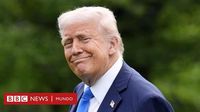In a bold move to bolster the struggling U.S. film industry, President Donald Trump announced plans to impose a staggering 100% tariff on all films produced abroad that are exhibited in the United States. The announcement, made via his social media platform Truth Social, has sparked a wave of reactions from industry insiders and international stakeholders alike.
Trump's justification for the tariff stems from his belief that foreign countries are luring American filmmakers away with enticing incentives, which he claims poses a significant threat to national security. "Other countries offer all kinds of incentives to lure our filmmakers and studios away from the United States. This is a concerted effort by foreign nations and, therefore, a national security threat," Trump stated. He has tasked the Department of Commerce and the United States Trade Representative with initiating the process to implement this new tax immediately.
The announcement comes amid alarming statistics from FilmLA, which reported a 22% decrease in filming within Los Angeles County during the first quarter of 2025 compared to the same period in 2024. Productions of series and feature films have seen declines of 30.5% and 28.9%, respectively. This trend has raised concerns among industry professionals who fear that the tariff could exacerbate the already dire situation.
While the specifics of the tariff are still unclear, including whether it would apply only to films financed by foreign companies or also to those produced by U.S. studios filming overseas, the implications are significant. Analysts have interpreted the proposed tariff as a potential retaliation against China's recent restrictions on U.S. films. In April 2025, Trump announced a 145% tariff on all products from China, which prompted a response from the China Film Administration stating it would reduce the number of U.S. films authorized for screening in the country.
China, now the second-largest film market globally, has become a crucial player in the international film landscape, with over 600 annual releases and revenues surpassing $7.5 billion in 2023. Experts warn that the U.S. film industry could suffer further losses if China limits American films, as many Hollywood productions depend on the Chinese market for recouping their investments.
Trump's decree also extends to the pharmaceutical industry, as he prepares to unveil details about tariffs on imported medications, which he claims will help revitalize American manufacturing. This dual approach aims to secure jobs in both the film and pharmaceutical sectors, but critics have raised concerns about the broader economic impact of such tariffs.
As the film industry grapples with the potential fallout from Trump's announcement, voices from various sectors have begun to express their concerns. For instance, Kirsty Bell, CEO of the production company Goldfinch, questioned how the tariffs would be enforced, pointing out that many successful films, like Barbie, were filmed primarily in the UK yet distributed by U.S. studios. Timothy Richards, founder of the European cinema chain Vue, echoed these sentiments, asking how Trump would define an "American" film, given the complexities of international co-productions.
The British media union Bectu warned that the tariffs could deliver a devastating blow to the UK film industry, which has seen significant growth due to tax incentives. In 2024, of the £2.1 billion spent on filming in the UK, £1.85 billion was attributed to foreign investment films. The union's leader, Philippa Childs, emphasized the need for swift action to protect the industry and its many freelancers.
In Spain, the president of the Association of Spanish Producers of International Audiovisual (PROFILM), Fernando Victoria de Lecea, urged caution regarding the proposed tariffs. He argued that a 100% tariff might not be feasible, especially since many successful productions, such as Game of Thrones, are not filmed in the U.S. but are American productions. He called for a more reflective analysis of how the tariffs would affect various sectors of the industry.
As the Trump administration explores the implications of these tariffs, there remains uncertainty about the broader effects on Hollywood and the international film community. The White House has indicated that it is still evaluating options to protect national and economic security while attempting to rejuvenate the film industry. Kush Desai, a White House spokesman, noted that they are exploring all avenues to ensure that Hollywood can thrive once again.
Despite the administration's rhetoric about revitalizing American cinema, critics warn that imposing such tariffs could backfire, leading to retaliatory measures from other countries and further isolating the U.S. film industry. Eric Deggans, a film critic for NPR, cautioned that the tariffs could create a scenario where the negative consequences outweigh any potential benefits, particularly if other nations respond with their own tariffs on American films.
In the wake of Trump's announcement, the global film industry is watching closely, as the implications of these tariffs could reshape the landscape of international cinema. With Hollywood's future hanging in the balance, industry leaders are left to ponder the question: will these tariffs indeed make Hollywood great again, or will they push it further into decline?





